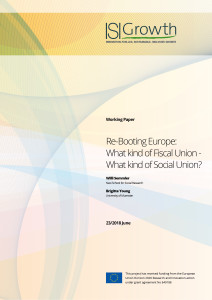Doomsday scenarios about the survival of the Euro and the European Union have gained prominence since Brexit. While we cannot deny the endogenous and exogenous challenges to the EU, these challenges can also function as an opportunity to think about how to achieve a European social market economy. Given the deficit in EMU’s institutional design, many experts believe that the next building block should be a fiscal and social union to improve fiscal policy coordination and foster social cohesion. This paper discusses the institutional requirements for fiscal capacity building and the introduction of a Eurozone Treasury. In the final section, the ideas of a European social market economy are spelled out, arguing that a modernized version of the concept of the German social market economy, as introduced by the economist Alfred Müller-Armack, may function as a starting point to ensure a fairer balance between markets and social cohesion.
Re-Booting Europe: What kind of Fiscal Union – What kind of Social Union?
Willi Semmler
New School for Social Research
University of Muenster

